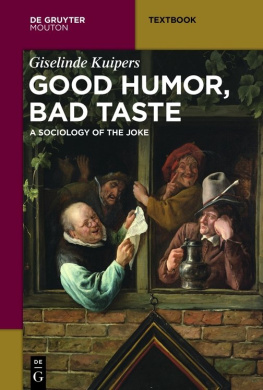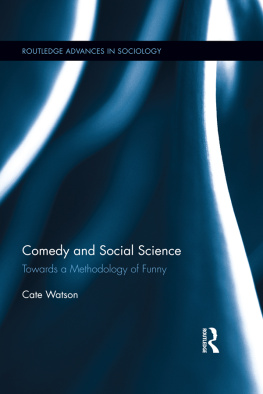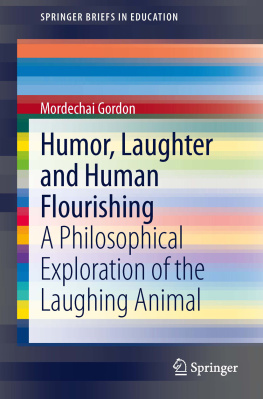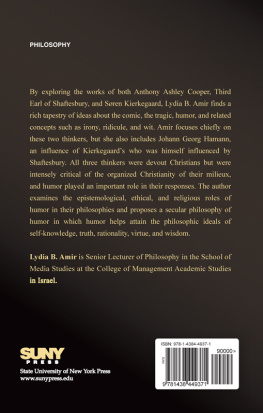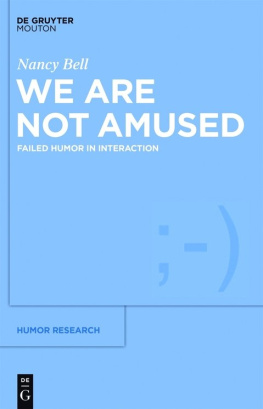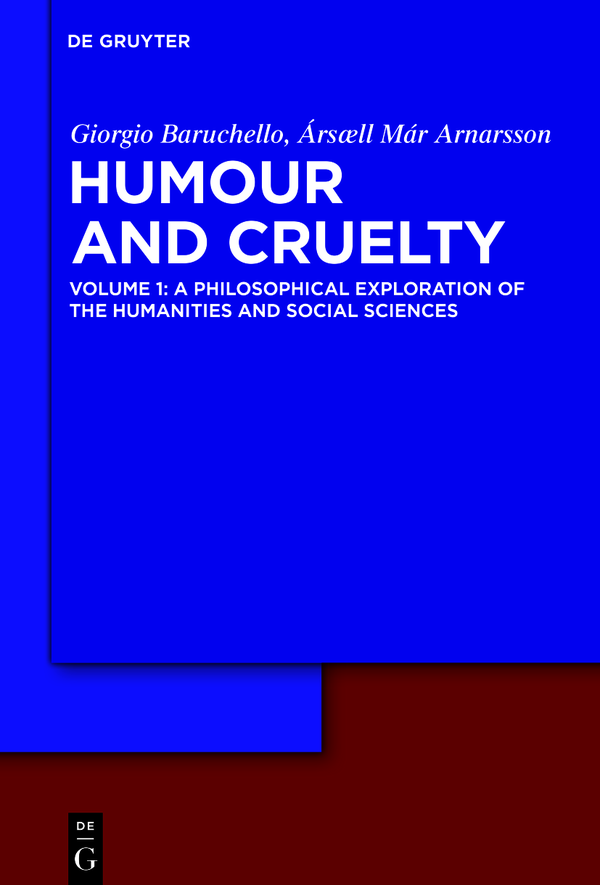De Gruyter Studies in Philosophy of Humor
Edited by
Lydia Amir
ISBN 9783110759761
e-ISBN (PDF) 9783110759839
e-ISBN (EPUB) 9783110760019
Bibliographic information published by the Deutsche Nationalbibliothek
The Deutsche Nationalbibliothek lists this publication in the Deutsche Nationalbibliografie; detailed bibliographic data are available on the Internet at http://dnb.dnb.de.
2022 Walter de Gruyter GmbH, Berlin/Boston
To Rachael and Gurur
Acknowledgements
Countless people must be acknowledged for having tried to prevent this book from being written. Every time either of its authors, when not even both of them, decided that it was a good time for jotting down some thoughts about humour and cruelty, someone showed up and claimed that there was a more urgent thing to be done. A merciless horde of students, colleagues, managers, ministers, administrators, children, close relatives, distant relatives, neighbours, neighbourly strangers and strange individuals conjured up all kinds of requests, duties, reports, reproaches, demands, reminders, delicate subjects and subjective derelictions that made it nearly impossible for us to complete our task. Even microscopic viruses believed it a brilliant idea to start wandering all over the planet, causing all sorts of disruptions to our project and, in the process, as severe a pandemic as the world had not seen since the final years of the First World War.
Nevertheless, in a proud feat of obstinate intellectual commitment, we succeeded; eventually. No challenge proved to be insurmountable, though they all were sufficiently challenging as to be, at least, a pain in the neck, in the back, or a headache. No enmity or adversity stopped us. Not even the episodic dissatisfaction of other experts, our darkest bouts of depression, a volcanic eruption taking place under our noses, the eruptions attendant earthquakes, chronic illnesses, or the occasional glitch in the software to which so much of our precarious daily existence and doubtful self-esteem are entrusted. Therefore, the book that you hold in your hands, or that you peruse on your computer screen, is the result of this prolonged struggle, as well as of a much longer and often painful process of acculturation, study, rumination, discussion, reconsideration, and occasionally mistyped expression. With this latter longer trajectory also in mind, we put hereby on record the names of a good fewer special persons who, unlike the barbarians at the gates that were mentioned in the opening lines above, demonstrated themselves to be genuinely helpful, if not pivotal, with regard to the present volume, either directly or indirectly.
Lydia Amir is the first human being deserving an explicit reference and singular commendation. Her inspiring and uncommon penchant for Giorgio Baruchellos research on the issue of humour, rather than on that of cruelty, plus her out-of-the-blue suggestion that these two distinct lines of his philosophical work should be combined together into a book, are the two main causes of the tome that rsll Mr Arnarsson and he ended up co-authoringand without murdering each other in the process (although, to be honest, some death threats were exchanged). This book, in short, is her fault. (Thank you, Lydia. It was a great idea. Hopefully, we did not disappoint you. Too much.) Besides, it is through Lydia Amir that we were able to interact effectively with two members of the International Association for the Philosophy of Humor who provided us with valuable feedback, i.e., Steve Gimbel and Ayelet Lilti. Similarly, it is through Lydia Amir that we were introduced to Christoph Schirmer, Senior Acquisitions Editor for Philosophy at De Gruyter, who proved to be not only remarkably compassionate for a publisher, but also gifted with a wicked sense of humour, as well as decisive in transforming our original project from a single monograph into three distinct books.
Mikael M. Karlsson and G. Roberto Buccola are two more names that must be added to our list of praiseworthy individuals. In very different ways, years, professional contexts, and volcanic islands, they made it possible for the two authors to get to know each other, appreciate each others professional skills and competences, realise their common grounds and shared interests, and exchange mutually a great deal of ideas and useful information. All of this happening, incidentally, long before the notion of a hefty volume dealing with humour and cruelty had even begun to be a theoretical, veritably academic, hypothesis. (By the way, over the same years, Giorgio Baruchello and rsll Mr Arnarsson managed to become very good friends as well, which made collaborating on the present book somewhat pleasant, at times, and generally tolerable an experience.)
There are then numerous persons who, in extremely diverse settings and sets of circumstances, facilitated each authors investigation of either key issue, i.e., humour and cruelty, though never both issues at the same time. These laudable persons are scattered all over the world: Antonio Casado da Rocha in Spain, Fabrizio Veneziano in France, Garrett Barden in Ireland, R.T. Allen (of the British Personalist Forum) and Kristjn Kristjnsson (of the Jubilee Centre for Character and Virtues) in England, Edward Hkon Huijbens in the Netherlands, Jacob Dahl Rendtorff in Denmark, Ingerid Straume in Norway, Tero Mustonen and Lars Gunnar Lundsten in Finland, Anastasiya Maria Savran in Austria, Zoltn Vajda in Hungary, Neri Sevenier in Israel, Liliia Ulaeva in the Russian Federation, Irakli Avaliani in Georgia, Juqian Li in the Peoples Republic of China, Tim Murphy in Malaysia, Charles Tandy in Taiwan, Evandro Agazzi in Mexico, Colin D. Pearce, Maggie Schein and Wendy C. Hamblet in the US, and, also in the land of the free, the kindest cruelty scholar who ever lived, Rev. Michael R. Trice, with whom innumerable views and considerations have been exchanged for many years.
Many notable and admirable individuals, however, are concentrated in three countries. In Iceland: Sigurur Kristinsson, Geir Sigursson, Jrgen Jamin, Svavar Alfre Jnsson, Rachael Lorna Johnstone, the very efficient and highly professional staff working at the only seemingly remote library of the University of Akureyri, and the talented duo comprising Raymond Snider and maestro Phil Doyle, who were curious and patient enough to assist us with some proofreading, which became eventually Audrey Matthews-Hills cup of tea. In Italy: Michele Marsonet, Carlo Penco, Emilio Mazza, Valeria Ottonelli, and Mirella Pasini, all of whom can be deemed experts in the humour-rife field of Baroncelli studies. In Canada: Jeff Mitscherling, Jeff Noonan, Natalie Ellen Evans, the prolific auteur Brendan Myers, the Socratic provocateur Chris DiCarlo, and the truly emeriti Ken Dorter and John McMurtry, who were most generous with detailed comments on select parts of our book. The latter emeritus, sadly, passed away one week before we submitted the final manuscript to De Gruyter.
Three more marvellous persons, whom we include here for many good reasons calling for no explicit belabouring, are, like Prof. McMurtry, no longer with us in this world. Their names are, propos, Flavio Baroncelli, plus gst r rnason and Ileana Szymanski. Hopefully, as we write these lines and think of them, they are enjoying each others humorous banter before Gods approving smile, rather than suffering alone before a devils cruel smirk. One day, though neither of us can know exactly when, we will go and check on how the four of them are doing. Wherever they are, it cannot be nearly as bad as it keeps being on this bizarre and suffering planet of ours.


